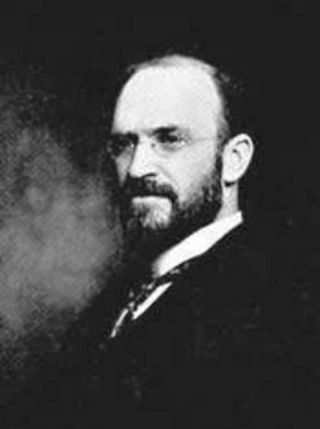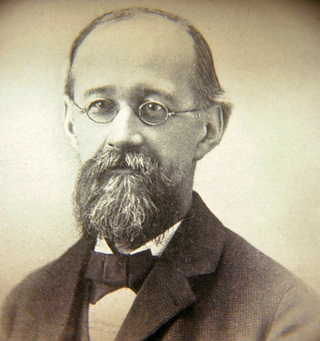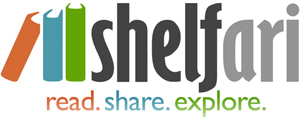
The Dewey Decimal Classification (DDC), colloquially known as the Dewey Decimal System, is a proprietary library classification system which allows new books to be added to a library in their appropriate location based on subject. It was first published in the United States by Melvil Dewey in 1876. Originally described in a 44-page pamphlet, it has been expanded to multiple volumes and revised through 23 major editions, the latest printed in 2011. It is also available in an abridged version suitable for smaller libraries. OCLC, a non-profit cooperative that serves libraries, currently maintains the system and licenses online access to WebDewey, a continuously updated version for catalogers.

Melville Louis Kossuth "Melvil" Dewey was an influential American librarian and educator, inventor of the Dewey Decimal system of library classification, a founder of the Lake Placid Club, and a chief librarian at Columbia University. He was also a founding member of the American Library Association. Although Dewey's contributions to the modern library are widely recognized, his legacy is marred by allegations of sexual harassment, racism, and antisemitism.

A library catalog is a register of all bibliographic items found in a library or group of libraries, such as a network of libraries at several locations. A catalog for a group of libraries is also called a union catalog. A bibliographic item can be any information entity that is considered library material, or a group of library materials, or linked from the catalog as far as it is relevant to the catalog and to the users (patrons) of the library.
The online public access catalog (OPAC), now frequently synonymous with library catalog, is an online database of materials held by a library or group of libraries. Online catalogs have largely replaced the analog card catalogs previously used in libraries.

Charles Ammi Cutter was an American librarian. In the 1850s and 1860s he assisted with the re-cataloging of the Harvard College library, producing America's first public card catalog. The card system proved more flexible for librarians and far more useful to patrons than the old method of entering titles in chronological order in large books. In 1868 he joined the Boston Athenaeum, making its card catalog an international model. Cutter promoted centralized cataloging of books, which became the standard practice at the Library of Congress. He was elected to leadership positions in numerous library organizations at the local and national level. Cutter is remembered for the Cutter Expansive Classification, his system of giving standardized classification numbers to each book, and arranging them on shelves by that number so that books on similar topics would be shelved together.
The National Information Standards Organization is a United States non-profit standards organization that develops, maintains and publishes technical standards related to publishing, bibliographic and library applications. It was founded in 1939 as the Z39 Committee, chaired from 1963-1977 by Jerrold Orne, incorporated as a not-for-profit education association in 1983, and assumed its current name in 1984.
The Library of Congress Subject Headings (LCSH) comprise a thesaurus of subject headings, maintained by the United States Library of Congress, for use in bibliographic records. LC Subject Headings are an integral part of bibliographic control, which is the function by which libraries collect, organize, and disseminate documents. It was first published in 1898, a year after the publication of Library of Congress Classification (1897). The last print edition was published in 2016. Access to the continuously revised vocabulary is now available via subscription and free services.
AbeBooks is an e-commerce global online marketplace with seven websites that offer books, fine art, and collectables from sellers in over 50 countries. Launched in 1996, it specialises in used, rare and out-of-print books. AbeBooks has been a subsidiary of Amazon since 2008.
Melvyl was the name of the online catalog of the University of California's library system. The Melvyl union catalog was produced by the California Digital Library — a unit within the department of Academic Planning, Programs, and Coordination at the UC Office of the President in downtown Oakland, California. Melvyl was named after Melvil Dewey, the library pioneer who invented the Dewey Decimal System. Melvyl was supported by the OCLC's WorldCat Local platform, which was retired in July 2021.

The following outline is provided as an overview of and topical guide to library and information science:

VTLS Inc. was a global company that provided library automation software and services to a diverse customer base of more than 1900 libraries in 44 countries. The for-profit company was founded in 1985 by Dr. Vinod Chachra, who became the President and CEO of the company. VTLS originated as "Virginia Tech Library Systems", an automated circulation and cataloging system created for Virginia Tech’s Newman Library in 1975. In addition to its headquarters in Blacksburg, Virginia, United States, VTLS had five international offices in Australia, Brazil, India, Malaysia and Spain. VTLS was one of the few ISO 9001:2008 quality-certified companies within the library industry for many years. The company was acquired by Innovative Interfaces in 2014.

Shelfari was a social cataloging website. Shelfari users built virtual bookshelves of the titles they owned or had read, and could rate, review, tag, and discuss their books. Users could also create groups that other members could join, create discussions, and talk about books, or other topics. Recommendations could be sent to friends on the site for what books to read.

NewGenLib is an integrated library management system developed by Verus Solutions Pvt Ltd. Domain expertise is provided by Kesavan Institute of Information and Knowledge Management in Hyderabad, India. NewGenLib version 1.0 was released in March 2005. On 9 January 2008, NewGenLib was declared free and open-source under GNU GPL. The latest version of NewGenLib is 3.1.1 released on 16 April 2015. Many libraries across the globe are using NewGenLib as their Primary integrated library management system as seen from the NewGenlib discussion forum.

Richard Rogers "R. R." Bowker was a journalist, editor of Publishers Weekly and Harper's Magazine, and founder of the R. R. Bowker Company.

Dewey Readmore Books was the library cat of the Spencer, Iowa, Public Library. Having been abandoned in the library's drop box in January 1988, he was adopted by the library and gained local attention for his story shortly thereafter.

Underground to Canada is an historical novel for young readers by Barbara Smucker. It was first published in Canada in 1977 and published in the United States the following year as Runaway to Freedom: A Story of the Underground Railway. Based partially on a true story, the novel is set in the United States and Canada in the years leading up to the American Civil War and depicts the hard lives of slaves in the American South and the people who helped them escape to Canada via the Underground Railroad. The novel is studied in many Canadian schools.
A library portal is an interface to access library resources and services through a single access and management point for users: for example, by combining the circulation and catalog functions of an integrated library system (ILS) with additional tools and facilities.
Natale Battezzati (1818–1882) was a printer and publishing house owner in Milan, Italy in the mid- and late 1880s. He was a founding member of the Italian book-trade society, Associazione tipografico-libraria italiana, and developed a card catalog system for booksellers that influenced American librarianship.
The National Library Service of Italy is a Ministry of Cultural Heritage and Activities promoted network of Italian libraries, in collaboration with Regions and Universities, and coordinated by the Central Institute for the Union Catalogue of Italian Libraries and Bibliographic Information.
The ALA Medal of Excellence is an annual award bestowed by the American Library Association for recent creative leadership of high order, particularly in the fields of library management, library training, cataloging and classification, and the tools and techniques of librarianship. It was first awarded in 1953 to Ralph R. Shaw, Director of the National Agriculture Library.











